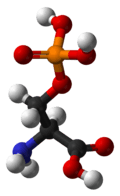Phosphoserine
 | |
 | |
| Names | |
|---|---|
| IUPAC name
(S)-2-Amino-3-(phosphonooxy)propionic acid | |
| Identifiers | |
| 407-41-0 | |
| 3D model (Jmol) | Interactive image |
| ChEBI | CHEBI:15811 |
| ChEMBL | ChEMBL284377 |
| ChemSpider | 62074 |
| DrugBank | DB04522 |
| ECHA InfoCard | 100.006.352 |
| EC Number | 206-986-0 |
| 1411 | |
| MeSH | Phosphoserine |
| PubChem | 106 |
| UNII | VI4F0K069V |
| |
| |
| Properties | |
| C3H8NO6P | |
| Molar mass | 185.073 g/mol |
| Melting point | 228 °C (442 °F; 501 K) |
| Except where otherwise noted, data are given for materials in their standard state (at 25 °C [77 °F], 100 kPa). | |
| | |
| Infobox references | |
Phosphoserine (abbreviated as SEP or J) is an ester of serine and phosphoric acid. Phosphoserine is a component of many proteins as the result of posttranslational modifications.[1] The phosphorylation of the alcohol functional group in serine to produce phosphoserine is catalyzed by various types of kinases.[2][3] Through the use of technologies that utilize an expanded genetic code, phosphoserine can also be incorporated into proteins during translation.[4][5][6]
It is a normal metabolite found in human biofluids.[7]
Phosphoserine has three potential coordination sites (carboxyl, amine and phosphate group) Determination of the mode of coordination between phosphorylated ligands and metal ions occurring in an organism is a first step to explain the function of the phosphoserine in bioinorganic processes.[8][9]
References
- ↑ Olsen, Jesper V.; Blagoev, Blagoy; Gnad, Florian; Macek, Boris; Kumar, Chanchal; Mortensen, Peter; Mann, Matthias (2006-03-11). "Global, In Vivo, and Site-Specific Phosphorylation Dynamics in Signaling Networks". Cell. 127 (3): 635–648. doi:10.1016/j.cell.2006.09.026. PMID 17081983.
- ↑ Krebs, Edwin G. (1985-10-01). "The phosphorylation of proteins: a major mechanism for biological regulation". Biochemical Society Transactions. 13 (5): 813–820. doi:10.1042/bst0130813. PMID 2998902.
- ↑ Manning, G.; Whyte, D. B.; Martinez, R.; Hunter, T.; Sudarsanam, S. (2002-12-06). "The Protein Kinase Complement of the Human Genome". Science. 298 (5600): 1912–1934. doi:10.1126/science.1075762. PMID 12471243.
- ↑ Park, Hee-Sung; Hohn, Michael J.; Umehara, Takuya; Guo, Li-Tao; Osborne, Edith M.; Benner, Jack; Noren, Christopher J.; Rinehart, Jesse; Söll, Dieter (2011-08-26). "Expanding the Genetic Code of Escherichia coli with Phosphoserine". Science. 333 (6046): 1151–1154. doi:10.1126/science.1207203. PMID 21868676.
- ↑ Rogerson, Daniel T; Sachdeva, Amit; Wang, Kaihang; Haq, Tamanna; Kazlauskaite, Agne; Hancock, Susan M; Huguenin-Dezot, Nicolas; Muqit, Miratul M K; Fry, Andrew M (2015-01-01). "Efficient genetic encoding of phosphoserine and its nonhydrolyzable analog". Nature Chemical Biology. 11 (7): 496–503. doi:10.1038/nchembio.1823. PMID 26030730.
- ↑ Oza, Javin P.; Aerni, Hans R.; Pirman, Natasha L.; Barber, Karl W.; ter Haar, Charlotte M.; Rogulina, Svetlana; Amrofell, Matthew B.; Isaacs, Farren J.; Rinehart, Jesse (2015-09-09). "Robust production of recombinant phosphoproteins using cell-free protein synthesis". Nature Communications. 6: 8168. doi:10.1038/ncomms9168. PMC 4566161
 . PMID 26350765.
. PMID 26350765. - ↑ Kataoka, H; Nakai, K; Katagiri, Y; Makita, M (1993). "Analysis of free and bound O-phosphoamino acids in urine by gas chromatography with flame photometric detection". Biomedical Chromatography. 7 (4): 184–8. doi:10.1002/bmc.1130070403. PMID 7693088.
- ↑ Jastrzab, Renata; Lomozik, Lechoslaw (2009-03-10). "Coordination mode in the binary systems of copper(II)/O-phospho-L-serine". Journal of Coordination Chemistry. 62 (5): 710–720. doi:10.1080/00958970802317855.
- ↑ Jastrzab, Renata (2009-05-01). "Phosphoserine and specific types of its coordination in copper(II) and adenosine nucleotides systems – Potentiometric and spectroscopic studies". Journal of Inorganic Biochemistry. 103 (5): 766–773. doi:10.1016/j.jinorgbio.2009.01.012. PMID 19230980.